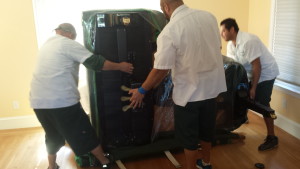 Do you know what it will cost you to move your home? If you call a mover for a quote, don’t be surprised when the final cost far exceeds what you were quoted over the phone.
Do you know what it will cost you to move your home? If you call a mover for a quote, don’t be surprised when the final cost far exceeds what you were quoted over the phone.
The cost of moving, especially if you are moving out-of-state and even just across town, can easily add up. Moving is stressful enough. Don’t be sticker-shocked. Here’s what you need to know when hiring a professional mover:
- Get an onsite estimate – not just a quote over the phone. Most established movers will provide a one-hour window of time during which you can expect to meet with their estimator. Even if you are just moving across town it is worth your time to schedule an onsite estimate. Quotes over the phone are typically under-estimated because they don’t include other hidden costs such as “long carries” – an extra charge for when a mover has to walk a long way between their truck and your front door. They also don’t include extra charges for stairs or fuel surcharges.
- Review and compare the estimates carefully. Long Distance moves are estimated based on weight. Local moves are estimated based on time. Tariff’s for long distance moves are set by law but estimates can still vary if a company over-estimates the weight of your items. Get at least two estimates but three are ideal. I recently had a client who received two estimates that were roughly the same but a third was significantly higher. Compare extra fees such as the cost of boxes, labor time, fuel surcharges and even sales tax. Other fees for disconnection of appliances and crating are generally extra. Since some of these extra fees are often based as a percentage of the weight – having an accurate weight is important.

- Decide what you are moving ahead of time. Take the time before you meet with movers to decide what furniture you are moving. Don’t schedule the estimate until you’ve done this because the estimate will depend on either the quantity of items you are moving (for local moves) or the weight (for long distance moves). Go through your house room-by-room and don’t forget your storage areas – garage, basement, attic, shed – as well as your patio or terrace. Place a bright colored label or sticky-note on every piece of furniture and large item you are moving. Don’t worry about deciding what you want to do with the things you are not taking. Just focus on the things you want. Don’t forget large lamps, speakers, artwork, fixtures, shelving units or exercise equipment. Here’s another reason to do an onsite estimate: A couple I know relied on a phone estimate but because they had so much stuff, as a result the movers had to return for another run since they estimated the move (by phone) for a smaller truck size. It ended up costing them almost double what they were quoted.
- Opt for added insurance. This is the most frequently overlooked cost of moving and yet for a relatively small amount it can save you hundreds if not thousands of dollars, particularly if you are moving a long distance. By law all professional movers must offer “Basic Coverage” which currently only insures your possessions at a rate of .60 per pound. This means that from an insurance standpoint, your valuable crystal china bowl will be valued at the same rate as your frying pan if they weigh roughly the same amount. Insurance is especially important if you are moving high value items such as original artwork, expensive electronics, fragile fixtures, antiques or valuable china. Make sure your movers provide “actual value” or “full replacement value” insurance options to you before hiring them. Expect to pay a few hundred dollars extra for insurance and compare quotes across movers. Even if your furniture is not high value, consider the cost of replacing it. You’ll still need furniture in your new home even if it’s furniture you’ve owned for years. Moving trucks have been known to break down. If your household goods need to be moved from one truck to another, mid-stream, during a rain storm, you’ll want to know your possessions are insured. (This is what happened to me on one of my three, cross country moves. Fortunately I had full replacement value insurance that covered my losses completely).
- Decide whether you will pack or whether you want the movers to pack for you. The cost of having professional movers pack is roughly the same as what they charge for labor time which can add to the cost but it may make sense if you are pressed for time, need to work or be at your new home or are physically unable (or unwilling) to pack your whole house. It also makes sense from a liability standpoint. If you pack a box and one of the movers accidentally drops it, they are not liable for the damage to the contents if it’s determined by the insurance adjustor that it was packed inadequately. If you can afford it, take advantage of your mover’s professional packing services , especially for your high value or fragile items. You can always save money on labor time if you pack your non-fragile items such as books, office supplies, kitchen items, linens, nicknacks yourself.
- Don’t pack your clothes. Most professional movers will move your dresser or wardrobes, clothes and all, if you just leave them there. Be sure to remove any fragile items however as these could be damaged during transport. Also, you don’t need to pack your hanging clothing as most professional movers will pack these for you, typically at no extra charge.
- Ask for discounts. Several professional movers will offer a variety of discounts. One company I worked with recently offered a senior discount which covered the cost of the “fuel surcharge.” Others have discount arrangements with real estate companies or other businesses. Ask your employer or real estate agent for a recommendation.
- Be ready to move! In general, local movers charge by the hour. Don’t wait till moving day to finish your packing or to defrost your refrigerator if you were planning on taking it with you. This will cost you! If you are moving long distance, this will add to the stress of your move day if you are not ready when the movers arrive or if you schedule something else to occur on moving day. Don’t water your plants on move day or pack wet laundry – movers wont take them.
- Don’t be afraid to negotiate. If you get two estimates and one is higher from your preferred mover, let them know you want to work with them. If they want your business, they will try to work with you. Know who the local agent/represen
tative is for your moving company and keep their number handy in case of any problems. The estimator is the sales person but it’s the local agent/owner that has the authority to correct any problems.
- Tips are permitted. While it’s not expected, the move experience you have often comes down to the driver and the moving crew. Generally these people operate on a thin margin. They are not getting the money you pay the moving company but they work the hardest. Set aside some extra cash to tip your movers and drivers for good service. I recommend tipping movers $3-$4 for each hour they worked and tip the driver/lead a little bit more.
If you would like other tips on how to have a stress-free move, call us! We’re not movers but we can manage every step of your move, including unpacking and home-setup, so you can step back into your new home like you’ve been there forever.









